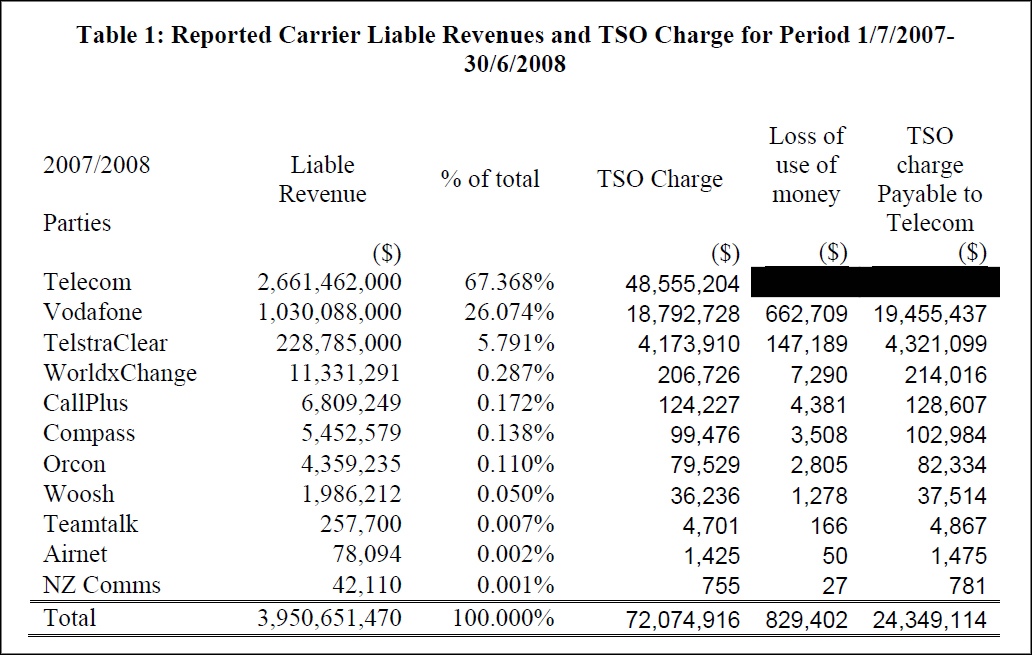ABOVE (Click to enlarge): A typical year's TSO Levy payments, calculated by the Commerce Commission and paid by rivals to Telecom to compensate it for servicing so-called "commercially non-viable" rural customers. Telecom itself was the largest "contributor" to the now phased-out TSO, but only in the form of a notional, paper transaction. Vodafone payments ranged from $16 million to $20 million a year. TelstraClear's share of the levy ranged from $3.5 million to $4.2 millin per year. Other providers chipped in less than $250,000 - in most cases a lot less. The commission's TSO calculation's for 2001 to 2009 are online here.
Although it has cleared its decks with Vodafone over a controversial rural telecommunications levy, a Supreme Court ruling released yesterday could still see Telecom refunding other carriers - notably TelstraClear.
On August 2, Telecom and Vodafone revealed they had settled three Supreme Court cases and two High Court cases out of court, plus two disputes before the Commerce Commission.
All related to Vodafone payments to Telecom under the (now being phased out) Telecommunications Service Obligation (TSO) regime, which saw Telecom compensated for providing service to “commercially non-viable” rural customers.
Vodafone had contended its payments to Telecom – which ranged from $15 million to $20 million a year – were too high. It also contended the Commerce Commission's TSO calculations were incorrect, because it did not take new technologies such as mobile into account. Each year, for seven years, Vodafone has headed to court to dispute the TSO.
Terms of the settlement were not disclosed. Telecom was looking to put the matter behind it before its pending separation.
Yesterday, the Supreme Court released a judgement formally dismissing the cases.
So is the endless TSO legal grind finally over? Not so fast.
The Supreme Court also upheld a a Court of Appeal decision that the Commerce Commission overestimated how much money Telecom should receive from rivals under the TSO between 2004 and 2006.
TelstraClear seized on a paragraph in the November 17 judgement, which states that while it would not be worth the commission recalculating the TSO levy owed by Vodafone to Telecom,
because the time, trouble and expense to the commission and to Telecom in undertaking a re-modelling exercise would be disproportionate to any benefit now that Telecom and Vodafone have settled. But that would be to disregard entirely the position of TelstraClear and the other liable persons who might stand to gain from an adjustment of their liabilities on a re-determination of net costs for the years in question.
The court agreed with Vodafone's original contention that the commission should have taken new technologies, such as mobile phones and wireless internet, into account in its calculations.
A spokesman for TelstraClear told NBR while his company thought this passage worth noting, "It is too early for TelstraClear to comment on what financial benefit this judgement will have for us or other telcos."
TelstraClear typically paid around $4 million a year in TSO levies, making it the second largest contributor after Vodafone, whose payments averaged around $16 million (see table top of story). Other TSO contributors - typically ISPs with a limited amount of voice business that was liable for the levy - contributed less (often a lot less) than $200,000 per year.
Given TelstraClear would only get a portion of its payments back if it succeeded in a challenge, it's probably moot whether a legal challenge would be worth the cost.
Vodafone spokesman Matt East said there were no financial implications for his company.
Telecom said it had no comment.
Earlier, Vodafone GM of corporate affairs Tom Chignell told NBR, "We've had seven years of this. It's time to move on,"
There's also another good reason to move on.
The two companies won a joint bid for the government’s $300 million, six-year Rural Broadband Initiative (RBI), which is replacing the TSO.
"Times marched on and the world's changed around us," Telecom spokesman Mark Watts told NBR at the time of the August settlement.
"It's time to move on given what we're doing together [with the RBI)."
The three Supreme Court cases settled out of court cover Vodafone TSO payments to Telecom for the years 2002/2003, 2004/2005 and 2005/2006.
The two High Court cases settled cover the years 2006/2007 and 2007/2008.
TSO disputes in front of the Commerce Commission for the years 2008/2009 and 2009/2010 have also been settled.
Vodafone contended that the Commerce Commission, which brokered the TSO, incorrectly calculated payments. But although the Commerce Commission calculated payments, the TSO regime saw Vodafone to make annual TSO payments directly to Telecom – leading to the head-to-head legal action.
Telecom shares [NZX:TEL] closed down 0.98% to $2.53 yesterday.



